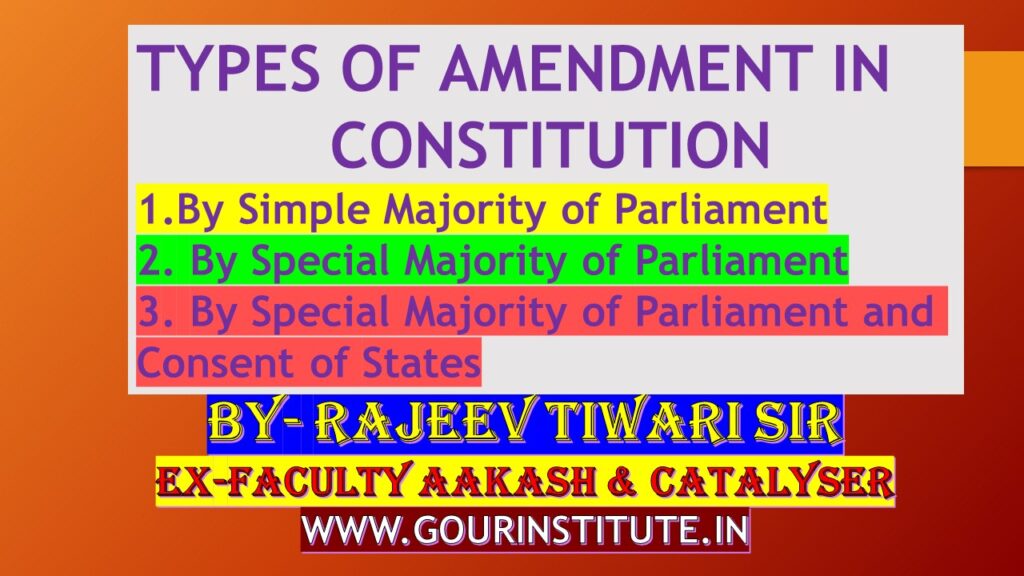TYPES OF AMENDMENT IN CONSTITUTION
Types of Constitutional Amendment in India
Article 368 in Part XX of the Indian Constitution deals with the powers of Parliament to amend the Constitution and its procedure.
It was borrowed from the South African constitution
The constitution can be amended in three ways:
Amendment by simple majority of the parliament(more than 50% of the members present and voting.)
Amendment by special majority of the parliament. (majority of 2/3rd members present and voting supportedby over 50% of the total strength of the House.)
Amendment by special majority by both the houses of the parliament, it requires consent of half of the state legislature by a simple majority.
Now all the three ways are explained below one by one:
By Simple Majority of Parliament:
So many provisions in the Indian Constitution can be amended by a simple majority of the two Houses of Parliament outside the scope of Article 368.
These provisions include:
1. Admission or establishment of new states
2. Abolition or creation of legislative councils in states
3. Formation of new states and alteration of areas, boundaries or names of existing states
Second Schedule—emoluments, allowances, privileges and so on of the president, the governors, the Speakers, judges, etc.
Rules of procedure in Parliament
Salaries and allowances of the members of Parliament
Quorum in Parliament
Privileges of the Parliament, its members and its committees
Conferment of more jurisdictions on the Supreme Court
Number of puisne judges in the Supreme Court
Use of English language in Parliament
Union territories
Delimitation of constituencies
Elections to Parliament and state legislatures
Citizenship—acquisition and termination
Use of official language
Fifth Schedule—administration of scheduled areas and scheduled tribes
Sixth Schedule—administration of tribal areas
By Special Majority of Parliament
‘Strictly speaking, the special majority is required only for voting at the third reading stage of the bill but by way of abundant caution the requirement for special majority has been provided for in the rules of the Houses in respect of all the effective stages of the bill’.
The provisions which can be amended by this way include:
(i) Directive Principles of State Policy
(ii) Fundamental Rights
(iii) All other provisions which are not covered by the first and third categories.
iii. By Special Majority of Parliament and Consent of States:
If one or some or all the remaining states take no action on the bill, it does not matter; the moment half of the states give their consent, the formality is completed.
There is no time limit within which the states should give their consent to the bill.
The following provisions can be amended in this way:
. Extent of the executive power of the Union and the states.
Election of the President and its manner.
Indian Constitution Articles And Their Subject
Supreme Court and high courts.
Representation of states in Parliament.
Any of the lists in the Seventh Schedule.
Distribution of legislative powers between the Union and the states.
Power of Parliament to amend the Constitution and its procedure (Article 368 itself).

